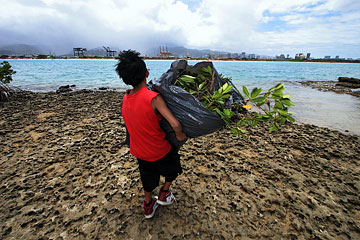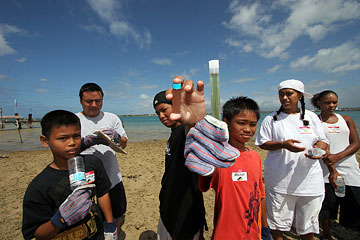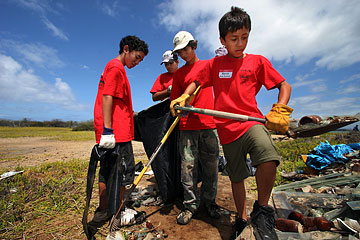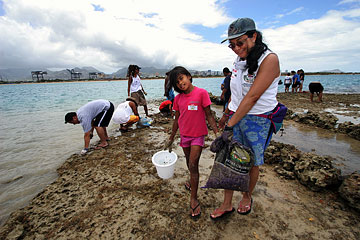 DENNIS ODA / DODA@STARBULLETIN.COMMakana Dement, 15, above left, and Halia Nakamaejo, 16, carry a bag of invasive algae collected from Mokauea Island to a collection point for disposal. Environmentalist Donna Kahakui is leading a group of volunteer youths in cleanup and restoration efforts on the island, which has the last ancient Hawaiian fishpond on Oahu. Kahakui recently received a $7,000 grant for the project, using it to buy a canoe to transport the volunteers to and from the island. CLICK FOR LARGE |
|
Rebirth of Mokauea
Activist-athlete Donna Kahakui inspires volunteers
» The restoration of Mokauea Island teaches kids invaluable lessons
MAKANA DEMENT, a 15-year-old student at the Myron B. Thompson Academy, is following in the footsteps of environmentalist Donna Kahakui, who has paddled solo between the Hawaiian islands to raise awareness for ocean cleanliness through her nonprofit organization Kai Makana.
"She has such a love and passion for the ocean, and I think what she's trying to do is cool," Dement, who lives in Kailua, said of her mentor. "She's trying to get the community to notice and take care of the ocean. She is so inspirational. She sets such a good example."
Last month, Dement and her parents and two sisters joined about 150 other volunteers from Kuhio Park Terrace public housing and Oahu universities and businesses to help clean Mokauea Island, a 3-acre islet just off Sand Island.
It contains one of the last ancient Hawaiian fishing villages, and Kahakui is leading efforts to restore it. The volunteers cleared the invasive keawe and limu, picked up rubbish and explored ways to refurbish a historic canoe dating back to 1877.
It was all part of Kahakui's latest efforts to connect young Hawaiians with their roots and demonstrate how to care for the land and ocean around them. Kahakui's leadership earned her a $7,000 grant for environmental preservation, which she immediately gave back to the youngsters she mentors in the form of a new canoe that will transport them to the island they are restoring.
 DENNIS ODA / DODA@STARBULLETIN.COMScott Manning carries a bag loaded with mangrove that was cleared from the banks of the fishpond on Mokauea Island. He and others are helping to clean up and restore the island. CLICK FOR LARGE |
|
Restoring an island and pride
WHEN Donna Kahakui thinks something should change, she leads the way with strength and creativity, often combining diverse elements. Her latest venture involves an international grant from an environmentally conscious cosmetics company, a massive cleanup effort to restore an ancient Hawaiian fishpond in Oahu waters, and disadvantaged children who want to learn about their culture. A canoe ties it all together.
Kahakui is best known for her marathon solo outrigger canoe paddles between the Hawaiian Islands to raise awareness about ocean cleanliness and reef preservation through her nonprofit organization, Kai Makana. The 43-year-old federal agent and champion athlete decided that the small, deteriorating island of Mokauea, just off Sand Island, should be rejuvenated, and has included the children she mentors from Kuhio Park Terrace public housing in that commitment. "I'm not sure these kids have ever seen a fishpond," she said.
One Saturday last month, Kahakui led them -- and 150 other volunteers from Oahu universities and businesses -- through the initial phase of the island's refurbishment.
 DENNIS ODA / DODA@STARBULLETIN.COMA weather-beaten canoe dating back to the 1800s was found on Mokauea Island. Restoration project leader Donna Kahakui plans to refurbish it with her group. Cyrus Aton, left, and Michael Peralta hold up water samples collected on the island. They performed acidity tests and took oxygen readings on them, then discussed their findings. CLICK FOR LARGE |
|
"This is a place that needs a lot of help but is a true educational center," said Kahakui. "This was the first major push to take care of the island, not just to pick up rubbish." The volunteers did plenty of that but also cleared invasive keawe, limu and mangrove, taught water-quality testing to the kids, prepared to grow native plants and started to bring the fishpond back to life.
When the idea first blossomed, she borrowed outrigger canoes from other clubs to transport kids to Mokauea, incorporating the historical and cultural significance of canoe paddling into the lesson. On several occasions, however, canoes were not available. It did not take long for the kids to tell her -- and for her to realize -- that they needed their own canoe.
AS THE PROJECT progressed, a friend urged Kahakui to participate in a competition related to environmental preservation sponsored by Yves Rocher, a French cosmetics company. "I was just hoping I could get a grant out of it," said Kahakui, who was shocked when she topped all other entries from the United States.
Yves Rocher gave Kahakui $7,000 and selected her to represent the United States in Montreal and Paris last February. She spoke publicly with representatives from all over the world about making a difference in her home state and country.
 DENNIS ODA / DODA@STARBULLETIN.COMMatthew Velligar, left, Shannon Sousa, Hopena Pokipala and Kevin Bratt, with shovel in hand, gather broken glass on Mokauea Island. CLICK FOR LARGE |
|
"You needed a project, and Mokauea has been my project for the last two years," said Kahakui, who is always reluctant to talk about herself. But it turns out that her Hawaiian heritage is powerfully connected to this island, where her great-grandmother often fished alone. "It's my path," said Kahakui. "It's a destiny thing."
Indeed, her given name is Kahiwaokawailani, which means "the chosen one of the heavenly waters," Kahakui said. "It really means the one who's responsible for the ocean; the path is actually already laid out through the name."
It takes between $10,000 and $15,000 to buy a brand-new outrigger canoe. Kahakui applied the $7,000 grant toward the purchase of this cultural mode of transportation and immediately raised the remaining $3,000 necessary to build a canoe. She felt this was important for children who rarely get anything new.
"Our purpose is to teach the lifestyle and to utilize the canoe as a vehicle for unity, teamwork and leadership skills. Plus, you're going to an island to help somebody else. Even just picking up rubbish or moving lumber or helping the families -- that's huge."
 DENNIS ODA / DODA@STARBULLETIN.COMSusan DeCouet, of the Environmental Protection Agency, and Cathy Kerong haul a bag of invasive algae collected from Mokauea Island. CLICK FOR LARGE |
|
MAKANA DEMENT, 15, who volunteers with Kahakui, said she especially enjoys working with students from Kuhio Park Terrace public housing on this enterprise. "At first they're kind of shy and don't want to say anything," she said. "But they're really smart. They know things, and it's really cool how they just open up."
Indeed, the effort has united many disparate elements and people. It turns out that Yves Rocher is a community-minded cosmetics company that prides itself on using all-natural products, which is why company officials sponsored the grant. The fact that Hawaii was not the idyllic paradise they had imagined surprised and motivated them. Kahakui -- who eschews corporate endorsements and, ironically, makeup -- buys their skin products now.
"I'm not the leader of this project," Kahakui emphasized. "I'm a partner to do what I can to bring others in. ... I'm a paddler. I'm not a botanist. I'm not a fishpond-restoration guru. I'm not a carpenter. I'm just one person who's just trying to keep talking about it and bring kids to see a place that used to be self-sustaining. And once you start cleaning a place, you care about it more. It becomes about the gift of giving. And what you get in giving is the best reward. It's really the kids who inspired me."
The new boat will allow them to train as paddlers and transport themselves to the island. But Kahakui also hopes canoe clubs will donate their ailing boats to Kai Makana so that the kids can restore the outrigger canoes and use them for transportation.
The ultimate goal is to establish an educational center to encourage the art and science of navigation. But most of all, it is about cultural and emotional well-being.
"It's all about bringing things back to life," Kahakui said. "The people (who live on Mokauea) can't take care of the island, and they know it. That's why they're asking for help."

